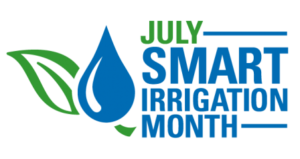Did you know that of the nine billion gallons of water Americans use outdoors every day at home, about half of that is wasted by runoff, wind, and evaporation? Most outdoor water waste is a result of overwatering landscapes, which can occur when our automatic irrigation systems are not installed or programmed smartly.
Celebrate Smart Irrigation Month this July by taking time to make sure your irrigation system is up to par and operating efficiently with a few intelligent tips from WaterSense.
Try cycling and soaking—apply water in multiple shorter cycles to allow it to soak into the soil. Instead of watering your landscape for 20 minutes straight, try four 5-minute rounds with soak breaks in between. The first soak prepares the soil for subsequent cycles, making it easier for water to penetrate the soil and reach the root zone, avoiding runoff and promoting deeper roots and healthier plants.
If you’re planning some updates to your landscape, you can also try grouping plants with similar watering requirements together for greater water savings. Using “hydrozones” can reduce water usage by watering to each zone’s requirements. Hydrozones can also protect plants from overwatering or underwatering, promoting the overall health of your landscape. For example, grassy areas should be in a separate hydrozone than shrub areas because of their differing water needs. For more watering tips and efficient landscape design ideas, check out the WaterSense Water-Smart Landscapes Guide.
How you water is important, but so is when! Avoid watering when it’s raining or in the middle of the day to reduce water waste. To take the guesswork out of watering, install a WaterSense labeled irrigation controller, which works much like a thermostat for your landscape by only watering when needed. And if you need help, remember that professionals certified by WaterSense labeled professional certification programs have the skills you need to design, install, and maintain a smart irrigation system.
For more information on “hydrozones”, visit https://www.loveyourlandscape.org/expert-advice/eco-friendly-landscaping/hydrozoning/designing-a-yard-using-hydrozones/



